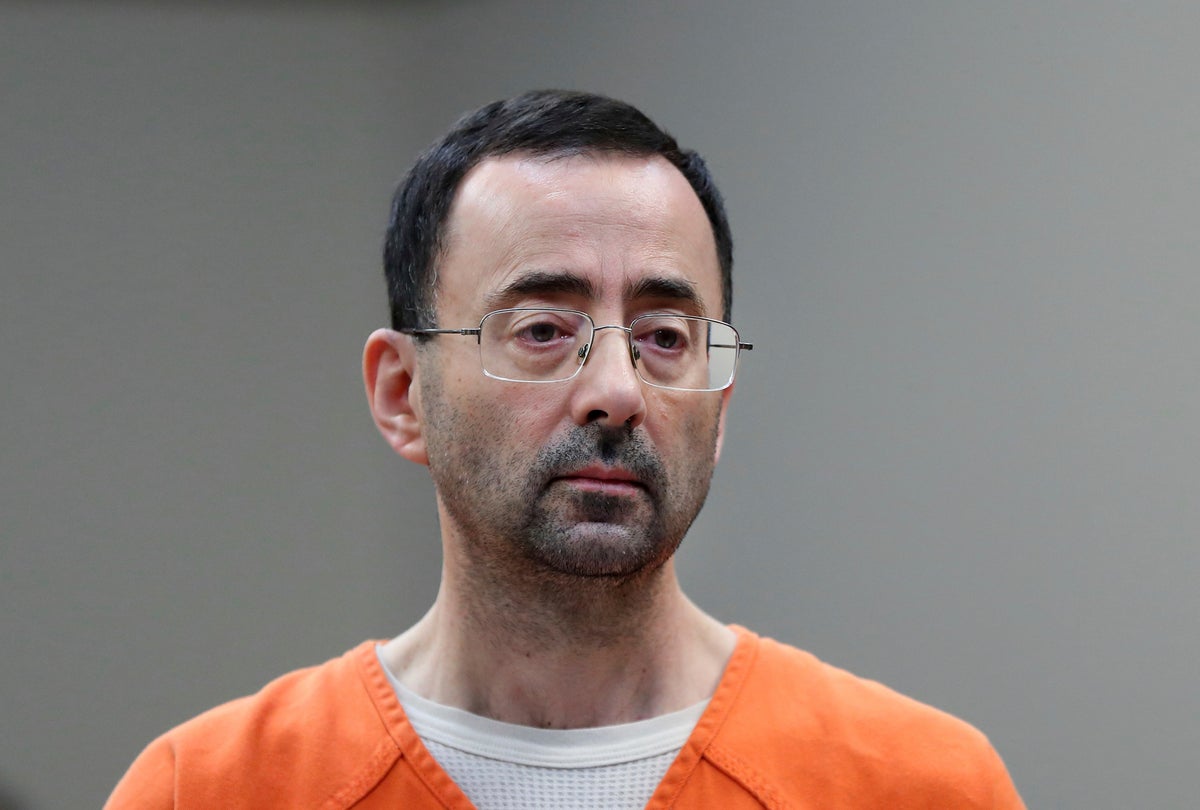
Two former FBI agents accused of mishandling sex-abuse allegations against former USA Gymnastics doctor Larry Nassar will not be charged with a crime, the Justice Department announced Thursday.
In a statement, officials said that after a “careful re-review of evidence,” the department “is adhering to its prior decision not to bring federal criminal charges,” adding: “This does not in any way reflect a view that the investigation of Nassar was handled as it should have been, nor in any way reflects approval or disregard of the conduct of the former agents.”
John Manly, a lawyer for many of Nassar’s alleged victims, called the decision “incomprehensible” and said the FBI agents “violated their oaths of office and colluded in the cover up of the worst sexual assault scandal in the history of sports.” He said the timing of the announcement -- shortly before a holiday weekend, and during coverage of a school shooting -- “is one more cynical attempt by the [Justice Department] to cover up FBI complicity” in the Nassar scandal.
The decision marks the third time that federal prosecutors examined whether a senior FBI official and a case agent should be charged with lying about their work on the Nassar case. Deputy Attorney General Lisa Monaco opened the review after several world-famous gymnasts in September gave tearful testimony to Congress, describing in horrifying detail the abuse they endured and their incredulity over the FBI’s decision not to further investigate Nassar after the allegations against him first surfaced.
Monaco, in announcing the review, said officials would look again at the issue because new evidence had surfaced. Though she did not specify what that evidence was, lawmakers have sharply criticized the Justice Department for not pursuing charges after the agency’s inspector general concluded a supervisory agent and his boss lied to internal investigators in a bid to cover up their failures.
It is rare for the Justice Department even to consider reopening a case that was closed without charges. One of the Nassar agents retired years ago and the other was fired last summer in the wake of Justice Department Inspector General Michael Horowitz’s scathing report, which found major missteps in the FBI’s handling of allegations against Nassar in 2015 that allowed him to victimise scores more patients before he was arrested by state authorities the following year.
In its statement, the Justice Department said it will “continue to learn from what occurred in this matter, and undertake efforts to keep victims at the center of our work and to ensure that they are heard, respected, and treated fairly throughout the process, as they deserve,” and said it wanted to work with Congress to address unspecified gaps in the law to “help prevent events like this from taking place in the future and hold perpetrators accountable.”
Sens. Richard Blumenthal, D-Conn., and Jerry Moran, R-Kan., called the decision “infuriating.” In a joint statement, they said, “FBI agents who knew of Larry Nassar’s abuse, did nothing and then lied about it, will face no legal consequences for their actions. Dozens of athletes would have been spared unimaginable abuse if these agents had just done their jobs. Their actions demand accountability.”
Simone Biles and three other high-profile gymnasts gave emotional testimony to the Judiciary Committee last year about Nassar’s abuse and the FBI’s failure to act.
“I blame Larry Nassar, and I also blame an entire system that enabled and perpetrated his abuse,” Ms Biles told the committee.
More than 330 girls and women have come forward to say they were victimized by Mr Nassar under the guise of medical treatments. He was ultimately convicted of state sex abuse and federal child pornography charges, and is serving an effective life sentence in prison.
Monaco and FBI Director Christopher Wray have also issued public apologies to Nassar’s victims, and Wray called the bureau’s failures “inexcusable. It never should have happened, and we’re doing everything in our power to make sure it never happens again.”
The key conduct at issue in the Nassar case occurred well within the federal statute of limitations for prosecuting those involved.
Supervisory Special Agent Michael Langeman, who was fired last year, allegedly lied to the inspector general’s office in interviews in 2020 and 2021, according to Horowitz’s report.
Langeman was questioned at length about why he did not pursue a case against Nassar, whether he had in fact referred the matter to a different FBI office, and why he wrote a report of an interview with a key victim more than a year after the interview took place.
The inspector general report did not identify Langeman by name but found that he lied to investigators “in an effort to minimize or excuse his errors.”
Horowitz also found that while the FBI was dealing with the Nassar allegations in late 2015, the head of the FBI’s Indianapolis office, W. Jay Abbott, talked to Stephen Penny, then president of USA Gymnastics, about getting Abbott a job with the Olympic Committee.
The inspector general said Abbott applied for the job but did not get it, and when confronted about it in 2019, falsely claimed to the inspector general that he had not sought the job. Penny resigned under pressure from his job with USA Gymnastics in 2017 and was charged in 2018 with evidence-tampering in the sex abuse case. Those charges were dismissed last month. Abbott retired from the FBI.
Langeman and Abbott did not immediately respond to requests for comment.
One of the FBI’s chief failures in the Nassar case was not alerting state authorities to the possibility that he might be committing sex crimes against children -- crimes that state prosecutors could, and eventually did, charge him with.
In response to that criticism, Justice Department officials have told federal prosecutors and agents to coordinate more closely with state and local law enforcement about potential crimes that may fall outside federal law but may still be worth pursuing.
“Even in those instances where the federal government cannot bring its own criminal charges, our obligation to protect crime victims and ensure public safety does not end,” Monaco wrote in a Justice Department memo. “Instead, proper coordination with state, local, or tribal law enforcement partners may become more important, particularly in the face of apparent, ongoing criminal behavior that puts victims at risk.”
WASHINGTON POST







